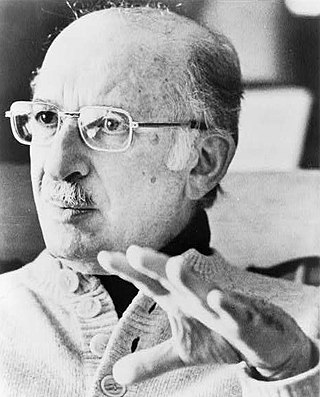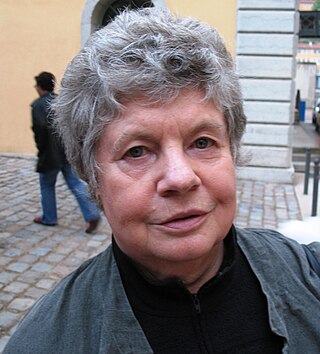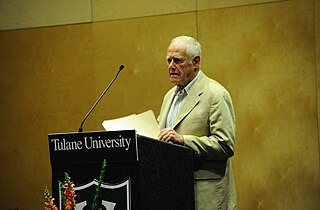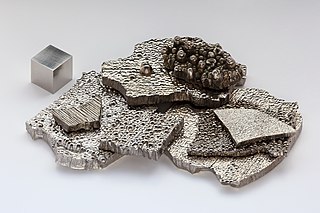Related Research Articles

Jerzy Kosiński was a Polish-American novelist and two-time president of the American Chapter of P.E.N., who wrote primarily in English. Born in Poland, he survived World War II and, as a young man, emigrated to the U.S., where he became a citizen.

The Unseen University (UU) is a school of wizardry in Terry Pratchett's Discworld series of fantasy novels. Located in the fictional city of Ankh-Morpork, the UU is staffed by mostly indolent and inept old wizards. The university's name is a pun on the Invisible College, and many aspects of the university are references to Oxford and Cambridge University. The exploits of the head wizards of the Unseen University are one of the main plot threads in the long-running fantasy series, and have played a central role in 13 novels to date, as well as the four supplementary Science of Discworld novels and the short story, A Collegiate Casting-Out of Devilish Devices.

Bernard Malamud was an American novelist and short story writer. Along with Saul Bellow, Joseph Heller, Norman Mailer and Philip Roth, he was one of the best known American Jewish authors of the 20th century. His baseball novel, The Natural, was adapted into a 1984 film starring Robert Redford. His 1966 novel The Fixer, about antisemitism in the Russian Empire, won both the National Book Award and the Pulitzer Prize.

Dame Antonia Susan Duffy, known professionally by her former married name, A. S. Byatt, was an English critic, novelist, poet and short story writer. Her books have been translated into more than thirty languages.

William Howard Gass was an American novelist, short story writer, essayist, critic, and philosophy professor. He wrote three novels, three collections of short stories, a collection of novellas, and seven volumes of essays, three of which won National Book Critics Circle Award prizes and one of which, A Temple of Texts (2006), won the Truman Capote Award for Literary Criticism. His 1995 novel The Tunnel received the American Book Award. His 2013 novel Middle C won the 2015 William Dean Howells Medal.

James Arnold Horowitz, better known as James Salter, his pen name and later-adopted legal name, was an American novelist and short-story writer. Originally a career officer and pilot in the United States Air Force, he resigned from the military in 1957 following the successful publication of his first novel, The Hunters.

Group 9, by modern IUPAC numbering, is a group (column) of chemical elements in the d-block of the periodic table. Members of Group 9 include cobalt (Co), rhodium (Rh), iridium (Ir) and meitnerium (Mt). These elements are among the rarest of the transition metals.

Hari Mohan Nath Kunzru is a British novelist and journalist. He is the author of the novels The Impressionist, Transmission, My Revolutions, Gods Without Men, White Tears and Red Pill. His work has been translated into twenty languages.

The Blind Owl is Sadegh Hedayat's magnum opus and a major literary work of 20th-century Iran. Written in Persian, it is narrated by an unnamed pen case painter, who addresses his murderous confessions to a shadow on his wall that resembles an owl. His confessions do not follow a linear progression of events and often repeat and layer themselves thematically, thus lending to the open-ended nature of interpretation of the story.

Sir Geoffrey Wilkinson FRS was a Nobel laureate English chemist who pioneered inorganic chemistry and homogeneous transition metal catalysis.
Roy Aubrey Kelvin Heath was a Guyanese writer who settled in the UK, where he lived for five decades, working as a schoolteacher as well as writing. His 1978 novel The Murderer won the Guardian Fiction Prize. He went on to become more noted for his "Georgetown Trilogy" of novels, consisting of From the Heat of the Day (1979), One Generation (1980), and Genetha (1981), which were also published in an omnibus volume as The Armstrong Trilogy, 1994. Heath said that his writing was "intended to be a dramatic chronicle of twentieth-century Guyana".
David Madden is an American writer of many novels, short stories, poems, plays, and works of nonfiction and literary criticism.
Nathan S. Lewis is the George L. Argyros Professor of Chemistry at the California Institute of Technology (Caltech). He specializes in functionalization of silicon and other semiconductor surfaces, chemical sensing using chemiresistive sensor arrays, and alternative energy and artificial photosynthesis.

Lanny D. Schmidt was an American chemist, inventor, author, and Regents Professor of Chemical Engineering and Materials Science at the University of Minnesota. He is well known for his extensive work in surface science, detailed chemistry (microkinetics), chemical reaction engineering, catalysis, and renewable energy. He is also well known for mentoring over a hundred graduate students and his work on millisecond reactors and reactive flash volatilization.
Ari Marmell is an American novelist and freelance role-playing game writer.

Roy A. Periana is a Guyanese-American organometallic chemist.

Gods' Man is a wordless novel by American artist Lynd Ward (1905–1985) published in 1929. In 139 captionless woodblock prints, it tells the Faustian story of an artist who signs away his soul for a magic paintbrush. Gods' Man was the very first American wordless novel, and is considered a precursor of the graphic novel, whose development it influenced.
Robert Van Norden Hine Jr. was a memoirist, historical novelist, and history professor who wrote several books. He is perhaps most famous for his 1993 memoir Second Sight, which recounts his experience of becoming blind at age 50 and partially recovering his sight 15 years later with the benefit of a high-risk operation.

The theme of blindness has been explored by many different cultures throughout history, with blind characters appearing in stories from ancient Greek mythology and Judeo-Christian religious texts. In the modern era, blindness has featured in numerous works of literature and poetry by authors such as William Shakespeare, William Blake, and H. G. Wells, and has also been a recurring trope in film and other visual media.
References
- ↑ David L. Hoof, Science@Purdue (Sept. 2006 Archived 2010-07-15 at the Wayback Machine ).
- ↑ Session 13, Information Gatekeepers, Inc., MFOC 87 (March 1987) at 188.
- ↑ Shadow Line Press Archived 2011-07-16 at the Wayback Machine